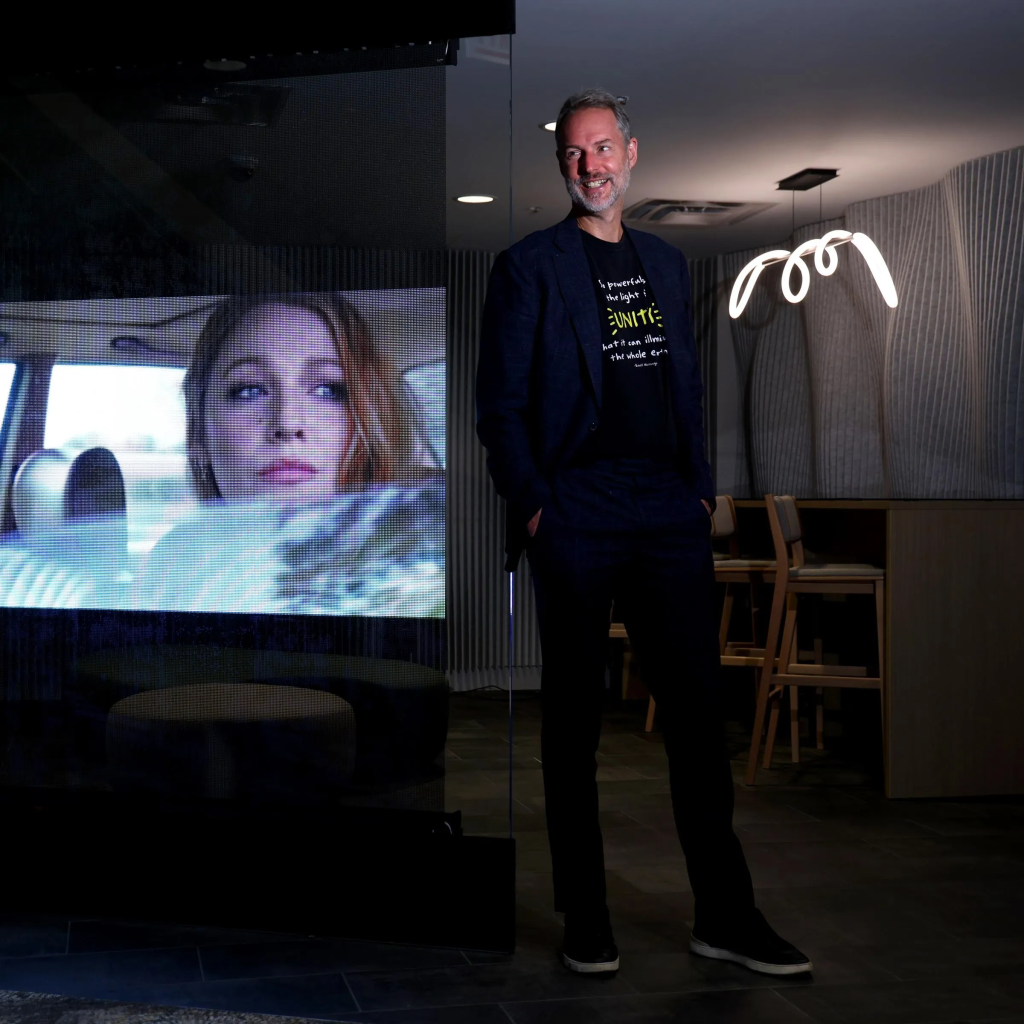Paylocity’s Steve Sarowitz cofounded film studio Wayfarer with Justin Baldoni and has bankrolled its movies, including It Ends with Us. Now he’s embroiled in a sexual harassment scandal involving some of Hollywood’s most powerful players.

When Justin Baldoni emerged grinning from a black van during a break from the rain at the Aug. 6 premiere of It Ends with Us in New York City, his co-star Blake Lively was nowhere to be seen. A private dispute between the actors was escalating, with Lively (and other cast members) declining to join him for any promotional appearances; she planned to arrive at the premiere once he’d left the red carpet. But one person who was present as Baldoni lingered for a few minutes on the Broadway pavement, taking selfies with fans, was his low-profile partner in Wayfarer Studios, the production company behind the movie: the billionaire founder of payroll software firm Paylocity, Steve Sarowitz.

Dressed in a navy suit, slim and six-foot-six, he hovered near the back of the group. Later that evening, Lively alleges in a complaint leaked in mid-December and again in a lawsuit filed on New Year’s Eve, Sarowitz said to an unspecified audience “that he was prepared to spend $100 million to ruin the lives of Ms. Lively and her family.” When asked to comment, Sarowitz’s lawyer Bryan Freedman confirmed that his client is prepared to spend whatever necessary to defend Baldoni, Wayfarer Studios and himself.
Lively claims in the lawsuit against Wayfarer, Baldoni, Sarowitz and associates that Baldoni (who also directed the film) sexually harassed her on set, and that he and the Wayfarer team then worked to tank her public reputation after she spoke up about the mistreatment. She names Sarowitz a handful of times in the filing and accuses him—the studio’s main financer—of bankrolling the smear campaign.
The Wayfarer team responded with a lawsuit of its own on the same day, Dec. 31, against the New York Times—which first reported the details of Lively’s civil rights complaint—arguing that the outlet published a misleading story without the context that would have exonerated them. They shared text message evidence that wasn’t published in its entirety and claimed that the backlash against Lively had been organic, spurred largely by her “tone-deaf” promotion of the film, which portrays domestic violence.
Sarowitz remains a fierce defender of the studio and of Baldoni. In his first public statement about the legal battle, Sarowitz emailed Forbes that “the actual harassment and smear campaign both occurred and continues to occur against us,” calling Lively’s accusations “vicious lies about my business partners.”
Sarowitz certainly has the money to fund this fight. He is worth an estimated $2.5 billion, $1.8 billion of which is tied up in shares of the publicly traded software firm he ran as CEO until 2011 and on whose board he still sits, with $700 million in cash and other investments, based on Forbes’ estimates.
Related
Becoming embroiled in a sexual harassment scandal is likely the last outcome Sarowitz expected when he cofounded Wayfarer with Baldoni in 2019.
The pair envisioned the studio as a place to produce films with positive messages that would help make the world a better place. It’s a goal toward which Sarowitz has been putting his resources since Paylocity’s 2014 IPO abruptly left him with an enormous fortune: $560 million worth of shares (the stock price has since gone up eightfold). He has contributed nearly $250 million so far to his two charitable foundations and says he intends to give away nearly all his money before he dies.
That was also the year that Sarowitz claimed to have an epiphany. Having started studying the Bahá’í faith at the recommendation of a friend around when he handed over the reins at Paylocity, he says he had a four-day spiritual transformation while visiting the prophet Bahá’u’lláh’s shrine in Akko, Israel. Baháʼí, which has some 5 million adherents and was founded in 19th century Persia, teaches that all faiths come from the same fundamental religion and advocates for universal equality. A year later, he formally converted from Judaism.

Sarowitz gives weekly tours at the Bahá’í temple in Illinois near his home whenever he’s in town; it happens to be the only Bahá’í House of Worship in the U.S.
Monica Hunter-Hart
Sarowitz first connected with Baldoni around 2018 while producing the documentary The Gate about the origins of Baháʼí. Sarowitz, who leads Baháʼí study groups as a hobby, asked Baldoni, who also practices the religion, for advice on the project. The pair quickly became friends, bonding over a shared idealism of movies as vehicles for changing lives and a dislike of the profit-obsessed ethos of Hollywood. “I cry sometimes when I think about how lucky I am to have Justin as a partner,” Sarowitz told Forbes in April when he sat for an interview on an unrelated topic.
Sarowitz supplies all of Wayfarer’s funding, while Baldoni—who rose to prominence through the TV show Jane the Virgin—provides a well-known face for the company and does more of the creative work, including directing several of its films (as Sarowitz told Inspired Insider in 2021, “I’m the money and he’s the fame.”). For It Ends with Us, which had a budget of over $25 million and grossed $351 million at the box office, the studio split costs with distributor Sony.
Altogether Sarowitz says he has spent more than $140 million on uplifting films, mostly through Wayfarer Studios, like The Garfield Movie, which has grossed $257 million and highlights what Sarowitz calls “an inspirational father/son relationship.” He and Wayfarer teamed up with Zhang Xin—another Bahá’í billionaire, who made her fortune in Chinese real estate development—to help produce the 2023 film Ezra, based on a true story about raising a child with autism. Also in the pipeline, if nothing goes awry, is Scarlett Johansson’s directorial debut of Eleanor the Great, a story of an intergenerational friendship.
“Wayfarer Studios is having a banner year this year. It took a couple years, but people are coming to us,” Sarowitz said in April over breakfast in his hometown of Highland Park, outside Chicago. It Ends with Us, which was then a few months from its August release, is “our biggest movie,” he explained. “It’s a beautiful film. It’s really about the woman, played by Blake Lively, standing up for herself. It’s about women and fighting abuse of women. So you can see how that fits into my values.”
Nine months later, he is being accused of exactly the opposite of empowering women. Lively’s lawsuit claims that he, Baldoni and other Wayfarer associates retaliated against her for speaking up about harassment she faced on set, which allegedly included Baldoni improvising kissing scenes without her consent and entering her makeup trailer without invitation while she was unclothed and breastfeeding. Wayfarer’s lawsuit against the New York Times responds to some of her accusations; for example, it includes as evidence a text message in which Lively invited Baldoni into her trailer once while she was pumping breastmilk.

In July, in the midst of promotion for the film, Baldoni hired a crisis communications PR strategist named Melissa Nathan. He claims to have done so to protect himself from the measures Lively and her husband, actor Ryan Reynolds, were already taking against him, including allegedly pressuring his agency to let him go. (The firm, WME, did drop Baldoni as a client after Lively’s accusations first surfaced, but denies that it did so due to pressure from the star couple.) Wayfarer’s lawsuit against the New York Times claims that Nathan and Jennifer Abel, another PR specialist, helped Baldoni defensively manage the public narrative around him and the film using standard industry methods.
Lively’s lawsuit, meanwhile, alleges that the Wayfarer team used abnormal and egregious strategies to damage her reputation. Among them: astroturfing, the practice of publishing content that appears to come from members of the public but is actually placed by marketers, PR or other sponsors. The filing also notes that coverage of her went from largely neutral to mostly negative from August onward.
Sarowitz is mentioned by name just a handful of times in the complaint. It indicates that he was among those on set watching a birthing scene where Lively was almost nude as it was simultaneously being filmed and broadcast on monitors; his lawyer tells Forbes that he wasn’t on set then.
The complaint also alleges that Sarowitz “provide[d] input and ideas on ways to negatively influence the narrative against Ms. Lively and her family.” Through his lawyer, Sarowitz confirmed his intention to use his money to promote the truth about Baldoni and Wayfarer. His lawyer says he was barely involved with the film besides providing its funding, only visited the set twice and was not involved in the PR for the film.
When asked for a comment by Forbes, Lively’s legal team sent the following statement: “While we go through the legal process, we urge everyone to remember that sexual harassment and retaliation are illegal in every workplace and in every industry. A classic tactic to distract from allegations of this type of misconduct is to ‘blame the victim’ by suggesting that they invited the conduct, brought it on themselves, misunderstood the intentions, or even lied.”
They added: “We will continue to prosecute her claims in federal court, where the rule of law determines who prevails, not hyperbole and threats.”
Sarowitz and his team are ready. According to Wayfarer’s attorney, it has a second lawsuit forthcoming, this time against Lively and her team, which it could file as soon as later today.
This story was originally published on forbes.com and all figures in USD.



